Payroll is never simple — especially in construction.
Union rules, collective bargaining agreements, variable wage rates, and multiple worksites complicate the process from every angle. Then, there’s reporting for benefits, prevailing wages, and all the unique demands construction companies contend with.
To stay ahead, companies need powerful yet flexible payroll platforms. If you choose the wrong platform, it can turn payroll into a full-time headache.
But here’s the problem: when you start researching payroll software, most of what you’ll encounter is marketing noise. Big names often dominate “best payroll” lists, even when their software isn’t built to manage the realities of the construction industry.
At Sage HCM, we’ve helped construction companies save hundreds of hours each year by replacing legacy payroll processes with faster workflows with fewer errors. We understand what makes construction payroll unique — and which platforms are worth your investment.
This guide is our definitive list of the best payroll software for construction companies in 2025.
{{inline-cta-solutions-construction="/style-guide"}}
At a Glance: Best Construction Payroll Software
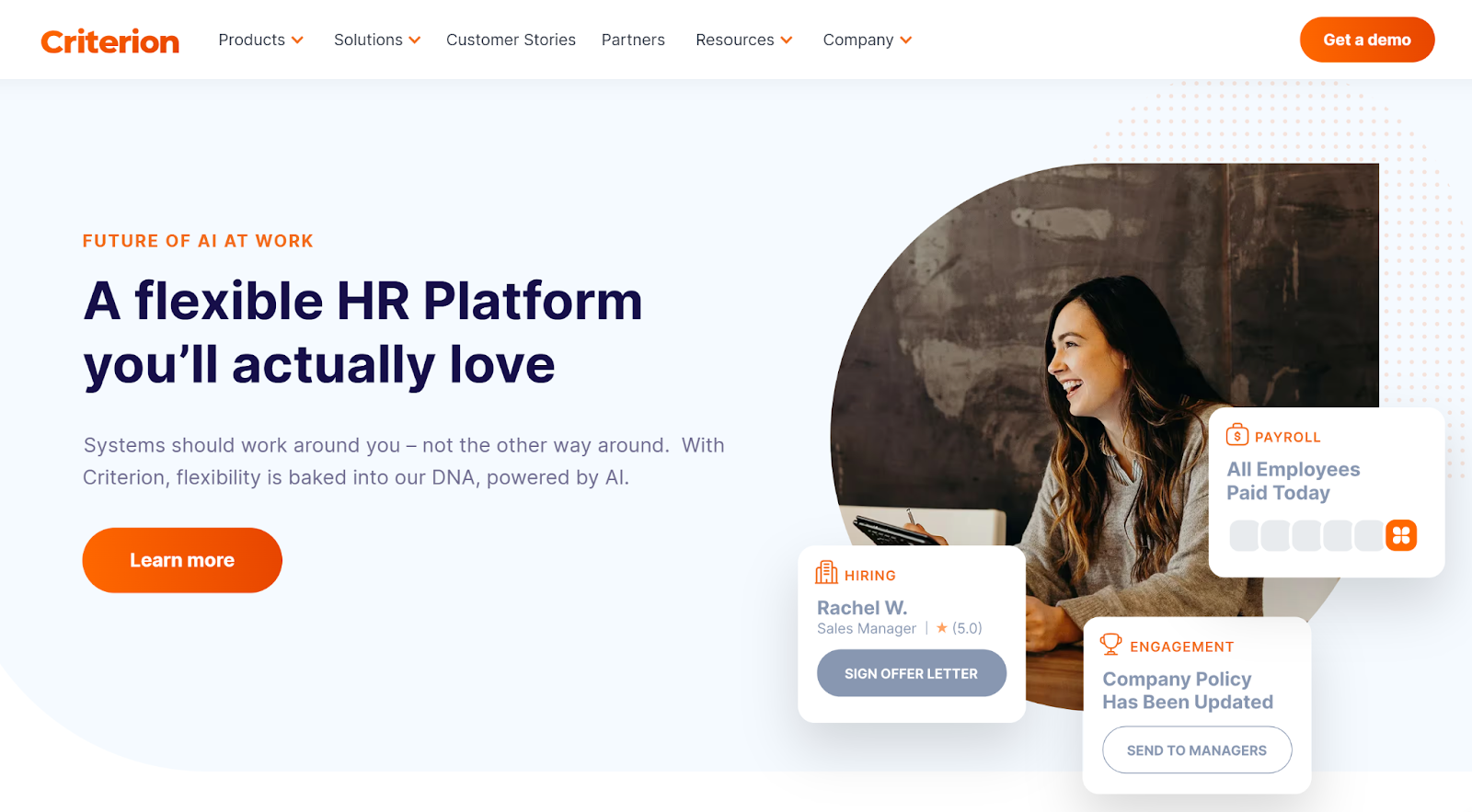
1. Sage HCM
Best Overall Payroll Software for Mid-to-Large Construction Firms
Sage HCM is more than payroll software for construction — it’s a full HCM platform that combines Payroll, HR, and Talent in a single database.
For contractors dealing with union rules, certified payroll, and multi-state crews, that unified structure and configurability makes all the difference. Instead of stitching together separate tools, Sage HCM keeps payroll, time, HR, and analytics in one place. Payroll managers and HR teams have full access to the backend to configure processes the way they need them.
Plus, each Sage HCM account receives a dedicated support rep to help with new configurations and adapting to new challenges.
Key Features
- Configurable Payroll Engine - Customize your system to support multiple unions, entities, states, and wage rules with ease.
- Built-in Tax Calculations - Automate tax filing and reporting (federal, state, and local) in the same platform.
- Certified Payroll and Prevailing Wage Compliance - Import collective bargaining agreements and other documents to update wages instantly.
- Mobile App (iOS/Android) - Enable employee self service (ESS) for time tracking (with GPS geofencing and facial recognition), PTO requests, and more.
- Automatic General Ledger Reporting - Instantly post general ledger reports to your ERP after each payroll run.
- Proven Integrations With Construction Software - Integrate Sage HCM with Procore, Trimble, Sage Intacct, and more — plus open API for custom workflows.
- Unified HR and Talent Suite - Link payroll with recruiting, onboarding, learning, benefits, position history, and more.
- Ongoing AI Roadmap - Save time with HR chatbot (ch.ai) with predictive analytics, policy/offer letter generation, and more features in development.
Strengths
- Full-suite HCM (Payroll + HR + Talent) on a single database plus an open API eliminates double entry.
- Built for complexity, the platform handles multi-union, multi-entity, and multi-state payroll with ease.
- Supports payroll for the United States, Canada, and the United Kingdom on the same platform.
- Scalable platform built to expand naturally as your workforce and data needs increase.
- Great fit for the construction ecosystem, especially via Procore and Sage Intacct integrations.
- Strong, intuitive mobile experience that empowers employees and managers simultaneously.
- Highly configurable platform with custom workflows to match your unique processes.
- Dedicated customer support rep and proven track record with large construction companies.
- Easy-to-use custom reporting for advanced visibility and insights.
Limitations
- Not ideal for solo contractors or teams with less than 50 employees. Sage HCM’s features and software infrastructure benefit growing construction companies more directly.
- Not a plug-and-play solution. Sage HCM is designed to be configured to your unique workflows. While it can work for construction out of the box, it works best with more detailed tailoring during implementation.
Ideal Fit
Sage HCM is best suited for construction companies (typically with 150 employees or more) who want one configurable system instead of juggling multiple apps. It’s built to handle complexity with extreme granularity, making it a strong match for firms managing multi-union, multi-entity, or multi-state payroll environments.
Companies already invested in tools like Procore and Sage Intacct will benefit from Sage HCM’s direct API integrations. Beyond that, the system is designed to be integrated with any third-party software to create seamless data flows and put people at the center of your operations.
For teams prioritizing compliance, Sage HCM has several built-in reports that are useful for tax filing, benefits reports, and government contracts, plus unlimited custom reports.
Why Sage HCM Is the #1 Payroll Software for Construction
In construction, labor drives your success. Sage HCM gives you better access to your people and payroll data than most other platforms on the market.
Sage HCM is one of the few full-suite HCM platforms truly built to handle construction-grade payroll complexity. Where other systems may claim to “support construction,” Sage HCM actually adapts to the way contractors already work.
Payroll connects cleanly with HR, recruiting, project management, and financial systems, so labor data is always in sync with the rest of your operations. That gives you better visibility without the headaches of juggling multiple systems.
With a dedicated support rep for every account and an active AI roadmap to improve accuracy and efficiency, it’s clear: Sage HCM is the most future-proof payroll software for growing construction companies.
Pricing
Sage HCM is one of the few HCM vendors with transparent list pricing and flexible module options. You can buy only what you need and add more (to the same database) when you’re ready.
- HR: $11 per employee/month
- Payroll: $6.50 per employee/month
- Talent Engagement: $6.50 per employee/month
There are no base monthly fees, and pricing scales with your workforce. Custom proposals are available for organizations with unique needs.
{{inline-cta-products-payroll="/style-guide"}}
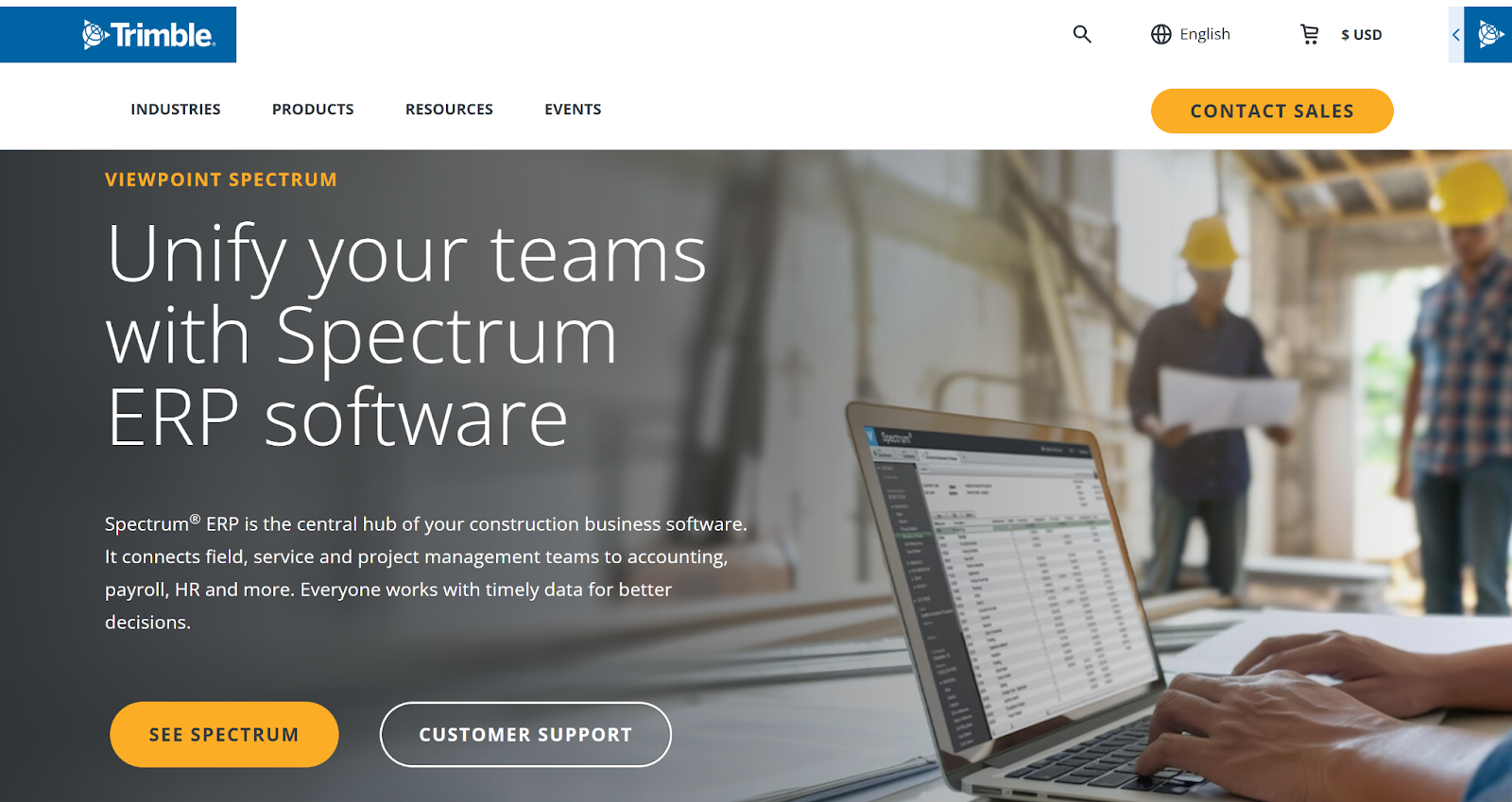
2. Viewpoint Spectrum Payroll (Trimble)
Best Payroll Software for Contractors Standardizing on Spectrum ERP
Spectrum is Trimble’s cloud construction ERP platform. Its payroll functionality is built for the heavy-duty demands of contractors — union rules, certified payroll reporting, and accurate job-cost allocation. Because payroll lives inside Spectrum’s financial core, labor data connects seamlessly to accounting for better alignment.
Spectrum’s blend of ERP and payroll makes it a strong choice for contractors who want tighter financial control.
Key Features
- Certified Payroll & Prevailing Wage Support - Native reporting with export formats (eCPR XML, AASHTOWare, LCPTracker).
- Union Payroll Tools - Manage wage/union codes, benefit tiers, and detailed union reports.
- Service & Maintenance Contracts - Run service and construction operations in one system, with real-time updates and payments from the field app.
- Multi-State Tax Setup - Automates annual updates across all 50 states; supports 941 and W-2 filings.
- Payroll Time Entry - Trimble mobile app captures crew and equipment hours by job/cost code.
- Employee Self-Service - Employees can access paystubs, PTO balances, and banking details directly.
- ERP Integrations - Fully embedded in Spectrum ERP and the Trimble Construction One ecosystem, with connections to tools like Procore and Sage HCM.
Strengths
- Trimble products are designed with construction in mind. Spectrum handles certified payroll, prevailing wage, and union compliance with built-in workflows.
- Payroll sits inside the ERP, giving you real-time job-cost visibility and eliminating manual data entry for accounting.
- Field data flows in through Spectrum’s mobile tools, cutting down manual entry and reducing errors.
- Employee self-service options with paystubs, PTO, and direct deposit setup also lighten the HR load and improve access.
Limitations
- Spectrum isn’t a standalone payroll solution. It only works if your company runs Spectrum ERP. If your team isn’t ready for a full ERP implementation, this may be more than you bargain for.
- HR and talent features aren’t necessarily the focus of Trimble’s products and may lack the functionality needed to manage a highly skilled workforce. However, this can be solved by integrating with Sage HCM through Trimble’s App Xchange.
- Certain construction-relevant forms (e.g., WH-347) may require add-ons like Trimble’s ProContractor.
Ideal Fit
Spectrum Payroll is best for large construction companies that want to use Spectrum ERP as their financial backbone. It’s a strong fit for firms that deal with a lot of union employees and need to connect financial data (like material and job cost) to payroll. While it is less HR-focused, there are several HR options through Trimble’s App Xchange.
Why We Chose It
Many construction companies already rely on Trimble’s solutions for accounting and project management. For these firms, keeping payroll inside the same ERP reduces friction with implementation.
It’s also clear that Trimble (as a company) is dedicated to the construction industry. Spectrum Payroll is efficient at meeting certified payroll, union, and multi-state requirements while keeping costs tied directly to jobs. Real users report reduced errors and significant efficiency gains.
Pricing
Trimble does not publish Spectrum pricing online. Companies must request a tailored quote through Trimble’s sales team.
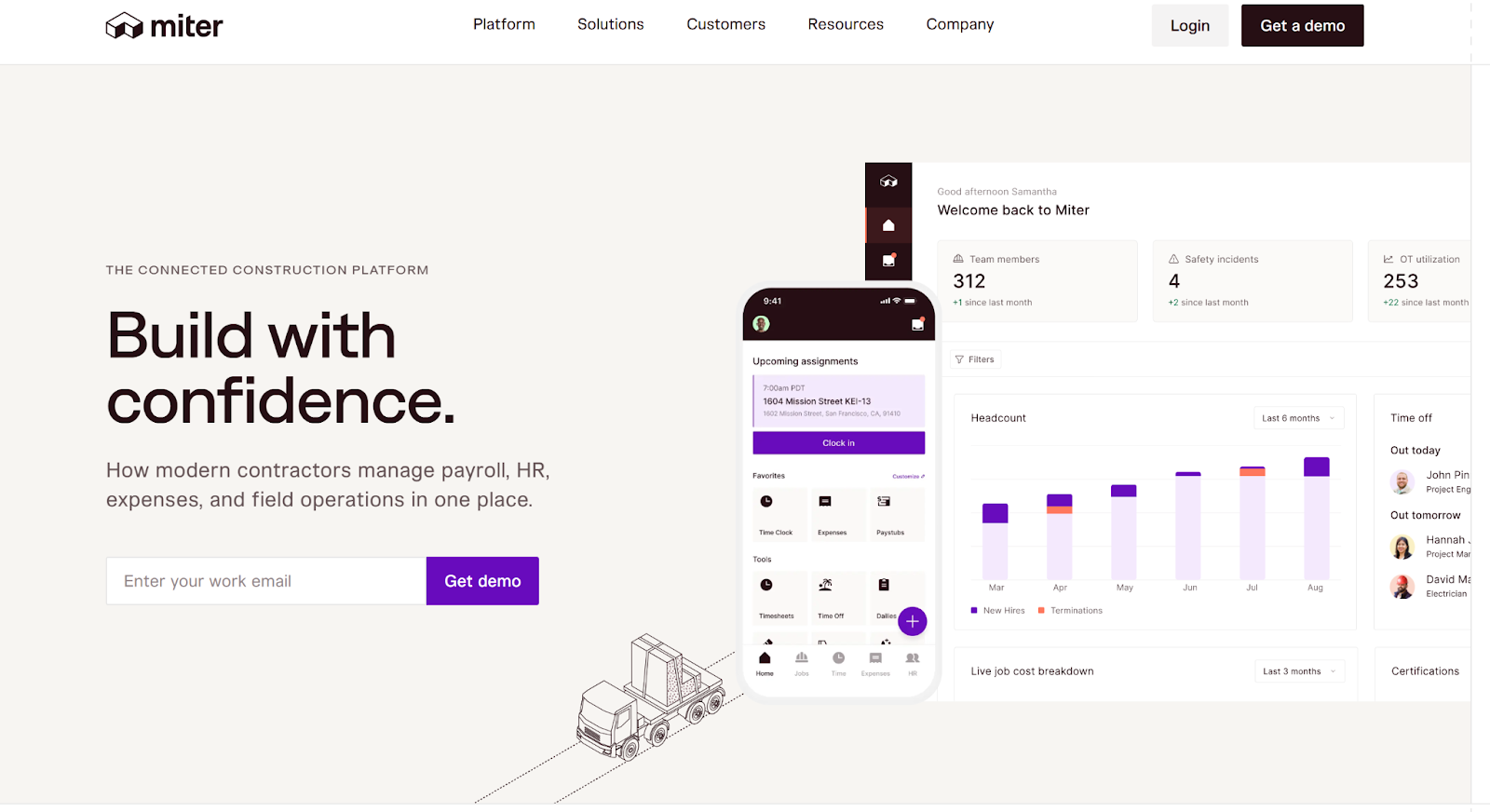
3. Miter
Best New Construction Payroll Software
Miter is an up-and-coming construction-first HCM and payroll platform. Newly founded in 2021, the platform is already gaining traction with construction companies. It unifies payroll, compliance, HR, and job costing into one system with support for several constructions-specific reports and calculations.
Miter is able to automate everything from Davis‑Bacon and prevailing wage reporting to mobile field entry. The platform also offers next‑day, no‑fee direct deposit and automated multi‑state tax filings.
Key Features
- Certified Payroll & Prevailing Wage Automation - Automates Davis-Bacon, state prevailing wage rates, fringe benefits, and certified payroll reporting.
- Union Payroll Support - Manages multiple pay rates, union classifications, and overtime rules with built-in workflows.
- Automated Multi-State Tax Filings - Calculates and files payroll taxes across states, simplifying quarterly and annual compliance.
- Next-Day, Free Direct Deposit - Provides fast, free ACH payroll so crews get paid promptly.
- Precision Job Costing - Links hours directly to projects and cost codes, showing fully-burdened labor costs in real time.
- Native Time Tracking With Field Controls - Enables mobile clock-in/out, supervisor entry, kiosk mode, geofencing, and compliance checks.
- Optional HRIS and Learning Modules - Extends payroll with additional HR capabilities (benefits, etc.) on the same platform.
- Integrations - Connects with QuickBooks, NetSuite, Acumatica, Procore, and other tools.
Strengths
- Purpose-built payroll software for construction, not a generic SMB solution.
- Handles construction payroll calculations well and automates multi-state tax filings to cut errors and reduce admin burden.
- Strong job costing with native time tracking that feeds payroll automatically.
- Improves cash flow for crews with next-day deposits.
- ERP and field integrations align labor data with accounting and project systems.
Limitations
- U.S.-Only – As of 2025, Miter only supports U.S. payroll needs. If you need to process payroll in other countries like the UK or Canada, you’ll need to use other platforms.
- Fewer Independent Reviews – As a newer company founded in 2021, Miter has fewer user reviews and less construction experience compared to established platforms like Sage HCM, ADP, or Arcoro.
Ideal Fit
Miter can be a good fit for US-based construction companies and specialty subcontractors that want to keep HR, payroll, and financial workflows in one ecosystem.
It’s also a strong fit for firms focused on accurate job costing, where labor, benefits, and workers’ comp need to roll directly into ERP or GL systems. Contractors using NetSuite or ServiceTitan may find Miter a natural complement as well.
Why We Chose It
Miter ranks high on our list because it’s built specifically to give construction companies the HR, payroll, and financial tools they need. While it is the youngest platform on this list, it’s clear they are paying attention to the needs of modern construction companies.
It automates compliance reporting, handles union rules well, and integrates with the financial and field tools contractors already rely on. Plus, it has built-in labor cost reporting, which is a rare find.
Pricing
Miter does not list public pricing. Marketplace listings show $15–$50 per user per month depending on company size and modules, but this is difficult to verify. Contractors will need to request a tailored quote for payroll, time, and HR bundles.
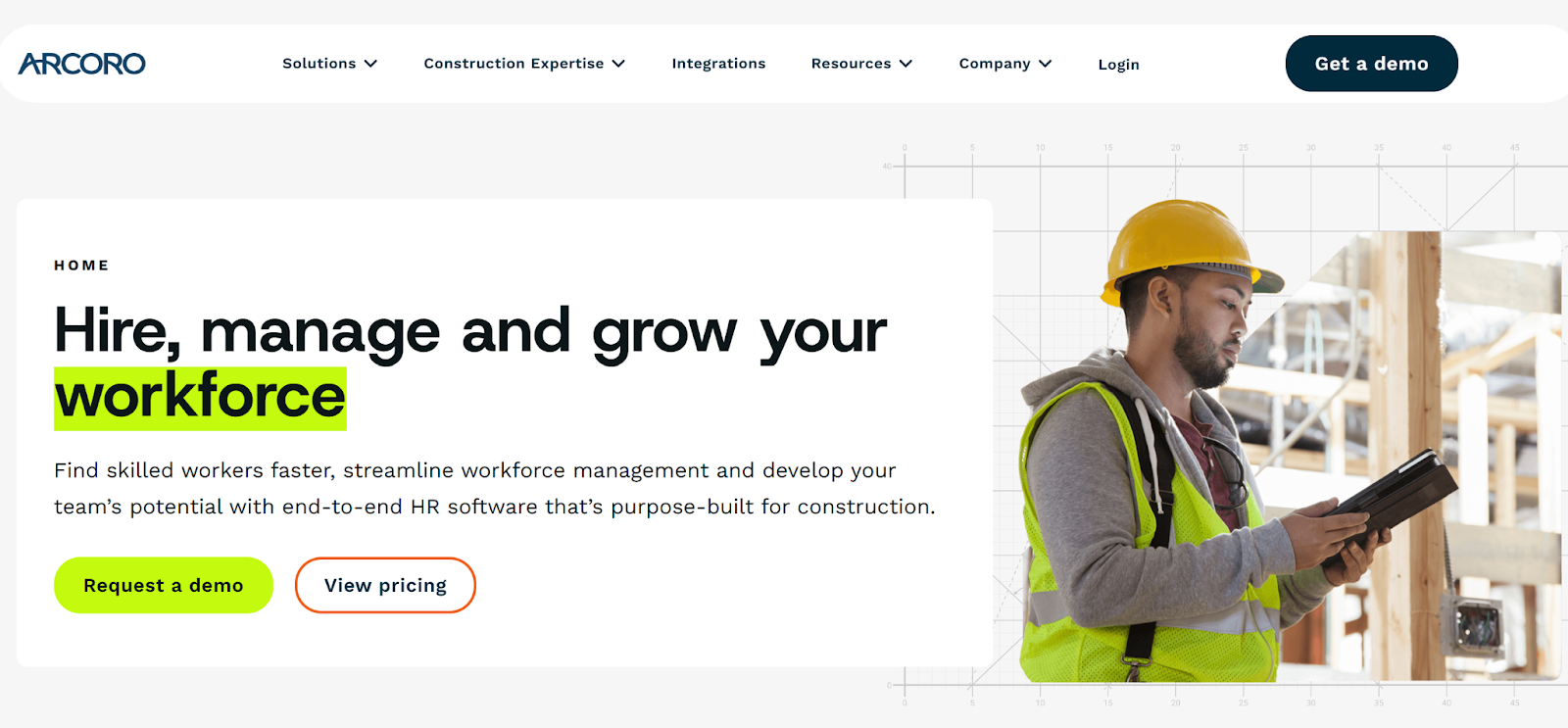
4. Arcoro
Best Payroll Add-On for Construction
Arcoro is a cloud-based HR platform founded in 2018 — built from the acquisition of several construction-focused tools like BirdDogHR, ExakTime, and InfinityHR. Today, Arcoro offers contractors a modular system to manage recruiting, onboarding, training, performance — and now payroll, with a clear focus on construction workflows.
Arcoro stands out by offering construction-specific compliance tools and a new payroll functionality built in partnership with Check.
Key Features
- Certified Payroll & Union Wage Calculations - Supports certified payroll reporting, union wage handling, and multi-state tax management integrated with time tracking.
- A La Carte HR Modules - Choose from standalone modules for HRIS, recruiting, benefits, learning, performance, and payroll (as needed).
- OSHA Compliance & Safety Tracking - Manages safety training, certifications, OSHA documentation, and expiration alerts through its learning management system.
- Mobile-Friendly Onboarding & Field Access - Offers field-ready onboarding (including jobsite kiosk mode), mobile clock-in/out, GPS time capture, and offline access.
- Integrated Platform With Construction Tool Stack - Seamlessly connects with common ERPs and project tools.
Strengths
- Because Arcoro is based on modular, construction-specific tools (like ExakTime for time tracking and InfinityHR for core HR), contractors can buy only what they need. Teams can even keep their existing payroll system and still split functionality with other platforms.
- Arcoro includes a full HR suite built for construction, featuring jobsite-friendly onboarding, mobile tools, and compliance workflows.
- Its platform tracks OSHA safety training, required certifications, and expiration alerts, helping contractors stay compliant on job sites.
- Arcoro’s mobile-first design supports crews and supervisors in the field with tools for onboarding, training, and time tracking.
Limitations
- Arcoro’s payroll features are new. However, they are intentionally built in partnership with Check (not just acquired like the other modules).
- Many users still rely on integrations with third-party payroll providers to handle certain aspects of payroll, which can add complexity.
- Arcoro is not a unified database, but a collection of software stitched together. That means some functions may not transfer data to payroll seamlessly (e.g., ExakTime is a required separate add-on for time tracking).
Ideal Fit
Arcoro works best for mid-sized contractors that already have a strong accounting system in place but need construction-focused payroll with a high focus on compliance. Paired with their HR platform, Arcoro can be valuable for firms managing multi-state crews with high safety and training requirements.
Why We Chose It
While Arcoro isn’t a unified database (which limits scalability), every company they acquired to build their platform was purpose-built for construction. That industry-specific foundation sets it apart from other “assembled” systems and makes it more dependable for contractors.
Its payroll module is still relatively new, which may create some hiccups. However, the compliance, safety, and HR management tools are mature and construction-ready. For contractors who want modular HR and payroll capabilities without replacing their entire system, Arcoro is a decent option.
Pricing
Arcoro does not publish pricing. Packages are tailored to your workforce size and the modules you choose. Costs scale with employee count and the number of tools deployed (such as recruiting, payroll, or LMS), so contractors should expect to request a custom quote.

5. ADP Workforce Now (Construction Edition)
Best Large-Brand HCM Option
ADP is one of the most widely used HCM platforms in the U.S., and its Construction Edition (Workforce Now) brings that reach to the contracting world.
ADP Workforce Now includes payroll, HR, time tracking, and talent management — with added tools for certified payroll, union rules, and job-cost reporting. Backed by ADP’s compliance resources and a dedicated Construction Client Services team, it’s aimed at mid-size to large firms that want an all-in-one solution from a provider with a longstanding brand reputation.
Key Features
- Robust Payroll Engine With Job-Cost Allocation - Handles labor cost tracking by project or phase for clearer financial oversight.
- Certified Payroll Reporting - Generates WH-347 and other certified payroll reports directly within the system.
- Prevailing Wage & Union Support - Automates prevailing wage and union rate calculations (including fringe benefits) to aid compliance on government projects.
- Construction-Friendly Time Tracking With Geofencing - Captures field hours using mobile apps with GPS geofencing to ensure accuracy in labor entries.
- Full HR Suite - Includes benefits administration, ACA compliance, recruiting, performance management, training, and succession planning tools.
- Built-In Compliance Resources & Expert Support - Offers checklists and guidance for OSHA, IRS, and DOL compliance, backed by ADP’s specialized construction support team.
Strengths
- ADP is a full HCM platform, offering end-to-end functionality that brings payroll, HR, and compliance together in one system.
- Although ADP serves many industries, Workforce Now for Construction is supported by a specialized team with compliance expertise.
- The platform integrates with widely used ERPs and project management tools to keep labor costs aligned with financials.
- Mobile time tracking with GPS and job allocation improves payroll accuracy and reduces errors in accounting.
- ADP is one of the most established and recognizable brands in HR and payroll, which may provide more confidence in the system.
Limitations
- ADP is designed for a broad user base, which means its workflows tend to fit the most common payroll and HR scenarios. While this approach works well for many companies, it can be less flexible for construction firms with unique payroll requirements.
- Implementing ADP can also be challenging, especially without dedicated HR tech staff. Many reviews point to the steep learning curve that comes with configuration.
- Customer support is a common complaint with ADP. While they have a large support team, smaller firms may receive less personalized service. Dedicated account managers aren’t always guaranteed, leaving some clients lost in their ticket system.
Ideal Fit
ADP Workforce Now (Construction Edition) is best for mid-size to large contractors that want one system covering HR and payroll, with the confidence of a well-established provider.
It suits general contractors with multi-state operations, union crews, and larger HR departments who need strong compliance backing. Companies outgrowing spreadsheets or smaller payroll vendors will find ADP a step up in scale and reliability.
Why We Chose It
We included ADP Workforce Now because it delivers breadth and compliance strength in a single platform. While ADP’s offerings tend to be less flexible than other platforms, Workforce Now seems to be a bit more specialized for construction.
Its certified payroll, union support, and job-costing tools show a real effort to meet construction’s unique needs. Plus, even if implementation has a learning curve, the compliance team provides a bit more peace of mind.
Pricing
ADP does not publish fixed pricing for Workforce Now. Costs are quote-based and typically calculated per employee per month (with setup and implementation fees).
{{inline-cta-wp-construction-recruiting="/style-guide"}}
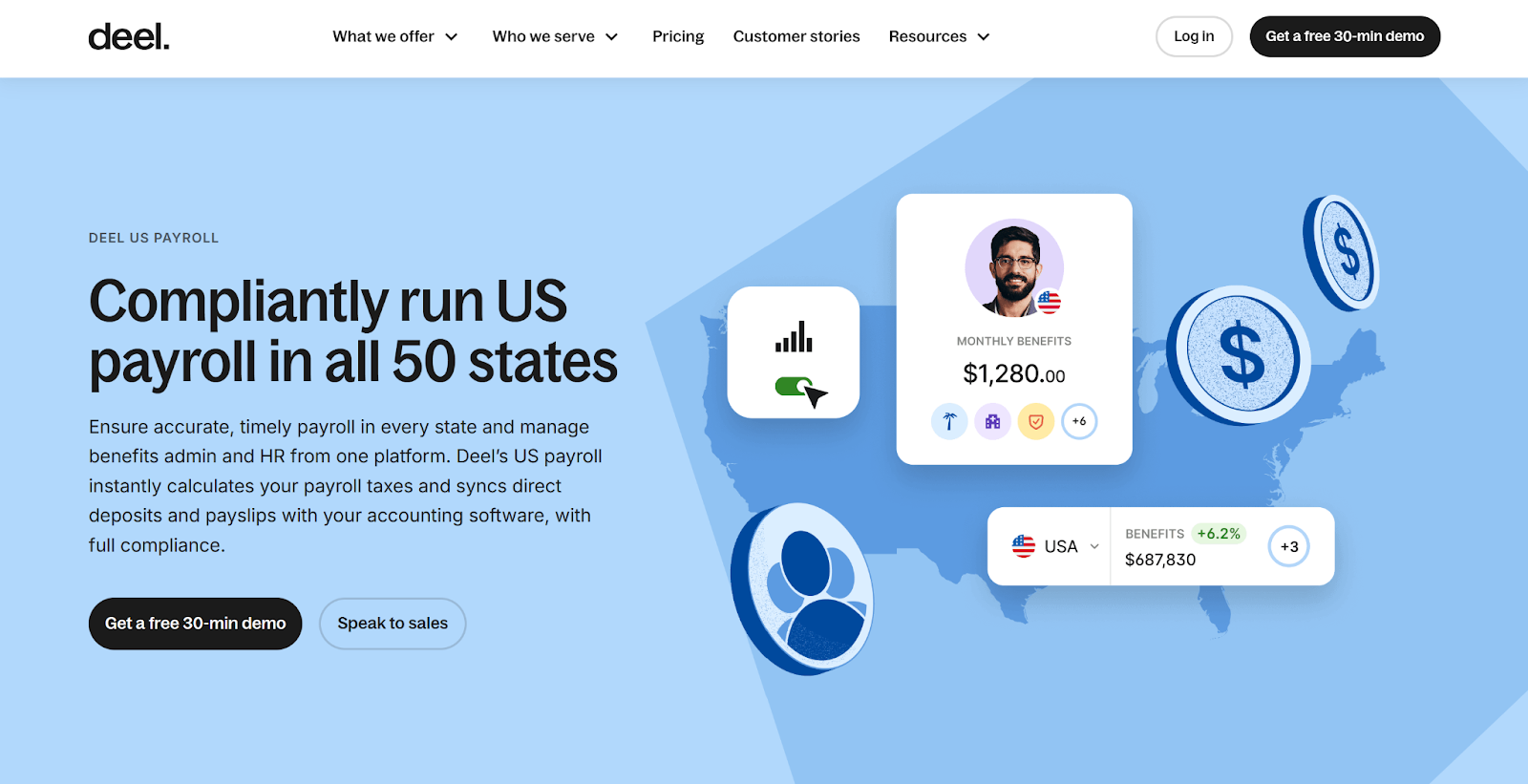
6. Deel US Payroll
Best Plug-and-Play US-Only Payroll Software
Deel’s US Payroll is a cloud-based payroll application designed to simplify compliance across all 50 states. Unlike its global outsourcing service, this is a true software platform that lets companies run payroll in-house while automating federal, state, and local tax filings.
It includes a built-in HRIS, syncs directly with accounting systems, and supports benefits administration. For construction firms with dispersed back-office or administrative staff, Deel offers a streamlined way to manage payroll without per-run fees.
Key Features
- 50-State Payroll (U.S.-Only) – Process payroll with built-in tax filing for federal, state, and local payroll taxes across all 50 states.
- Automatic Reporting – Generate and file W-2s, W-4s, and new-hire reports without manual effort.
- Off-Cycle Payments - Send and track payments outside of your normal payroll cycle without extra fees.
- Built-In HRIS – Manage core HR and benefits administration alongside payroll at no extra cost.
- 80+ Integrations – Connect to QuickBooks, Xero, NetSuite, BambooHR, Expensify, and more via open API.
- Centralized Dashboards – Gain a single view of payroll reporting across regions and entities.
- Contract Creation – Generate legally binding employment contracts directly within the platform.
Strengths
- U.S. Payroll is Deel’s true payroll software offering (not outsourced), which provides direct control over every pay run.
- Strong U.S. payroll compliance, with automated workflows that cover federal, state, and local taxes in all 50 states.
- HRIS included at no extra cost, reducing the need for additional systems.
- Broad integration ecosystem with accounting and HR platforms (e.g., QuickBooks, NetSuite, BambooHR).
- Modern, transparent pricing with unlimited pay runs and off-cycle processing included.
Limitations
- Deel is not construction-specialized. There’s no indication that the platform supports certified payroll, union rules, prevailing wage requirements, or any other construction-relevant features.
- Deel US Payroll can only be used in the United States. For global payroll, you’ll need to purchase separate Deel products.
- Some user feedback mentions onboarding challenges and occasional local tax issues during setup.
- Deel is a premium product, and one of the most expensive options on this list.
Ideal Fit
Deel US Payroll is a good option for construction firms that need simple, compliant payroll for U.S.-based teams. It’s especially useful for smaller groups operating across multiple states, where accuracy and compliance matter but union or certified payroll features aren’t necessarily required.
For construction companies that don’t need too many unique configurations, Deel offers a modern payroll platform that can still deliver strong value.
Why We Chose It
We included Deel on this list because it gives construction companies (and those in other industries) a clean, intuitive payroll platform. Although it comes with a premium price, Deel is recognized for its reliability and precision in payroll processing. Features like built-in off-cycle pay and support for multi-entity structures make it flexible for distributed teams.
The emphasis on 50-state compliance with a built-in HRIS and accounting system makes it a strong player in the HR software space. However, if you plan on expanding operations outside of the United States, costs will quickly stack up as you add more payroll modules.
Pricing
Unlike Deel’s other services, Deel US Payroll doesn’t publish its pricing. To obtain a quote, you’ll need to speak directly to sales.
For reference, Deel’s outsourced payroll services start at $29 per employee per month (global payroll).
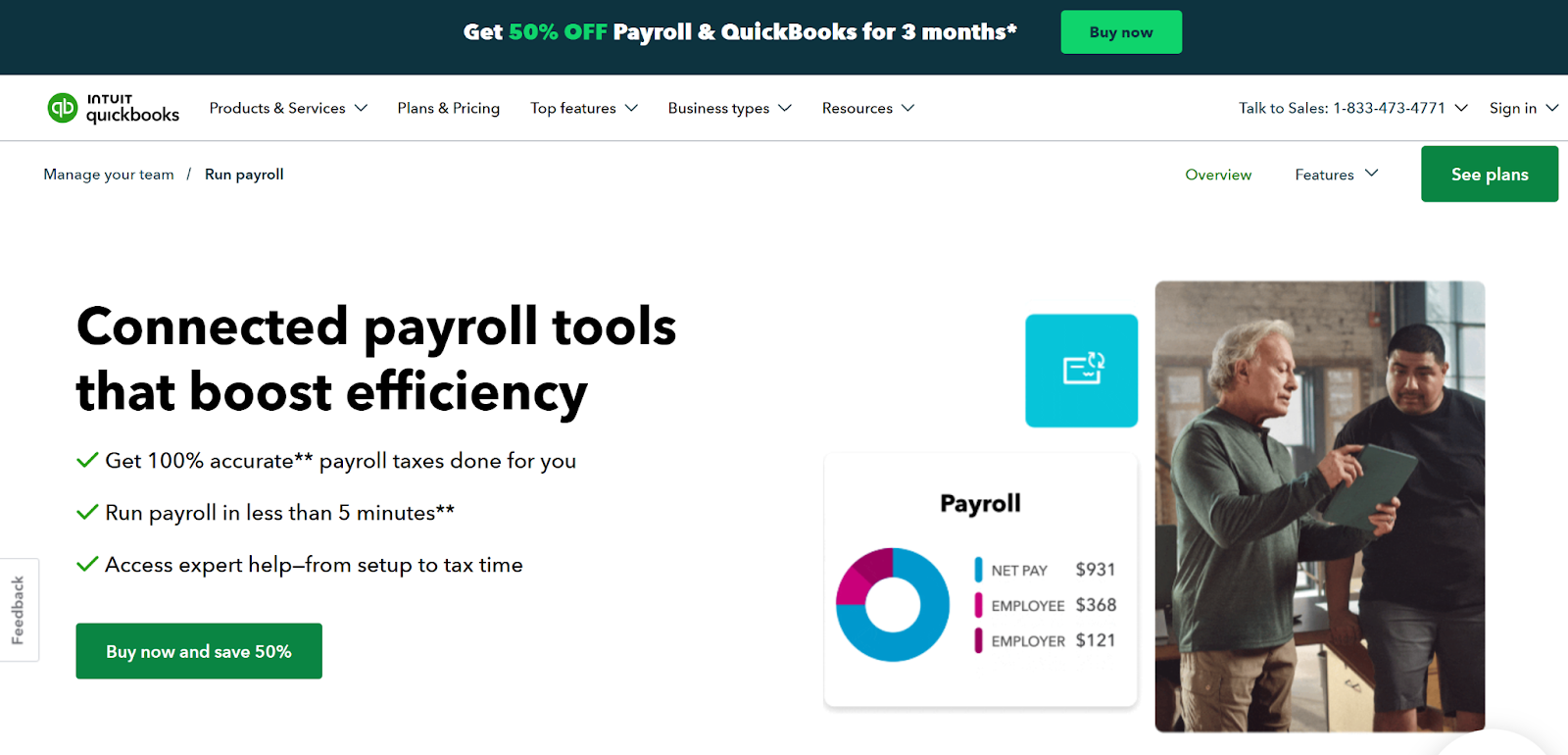
7. QuickBooks Payroll
Best Simple Payroll for Small Contractors
QuickBooks Payroll is Intuit’s payroll service that integrates directly with QuickBooks accounting, making it a popular choice for small construction businesses. It handles the basics — calculating paychecks, withholding taxes, filing forms, and making payments on time. It also automatically posts payroll expenses into QuickBooks ledgers.
Both online (cloud) and desktop versions are available, with the Desktop Contractor Edition offering stronger job-costing features. While not a specialized construction payroll tool, QuickBooks is widely used due to its simplicity and affordability.
Key Features
- QuickBooks Software Integrations - Sync directly with QuickBooks accounting, automatically posting wages, taxes, and employer costs to the ledger. Also links with QuickBooks Time (formerly TSheets) for mobile clock-in/out with GPS tracking.
- Automated Payroll Taxes - Calculate payroll taxes and supports e-filing for federal, state, and local forms. In fact, all subscriptions for QuickBooks now include full service payroll in addition to the software. This means they will file your taxes for you on the backend.
- Direct Deposit Options - Includes next-day direct deposit with standard plans and same-day deposits with premium plans.
- Support for Employees and Contractors - Processes payroll for both W-2 employees and 1099 contractors, including year-end form generation.
- Employee Self-Service Portal - Provides online access (“Workforce”) for pay stubs, W-2s, and PTO balances.
- Benefits and Workers’ Comp Integration - Offers health benefits through partners and supports “pay-as-you-go” workers’ comp in certain plans.
Strengths
- QuickBooks Payroll is known for its ease of use, especially if your team already works in QuickBooks. The familiar interface lowers the learning curve and can make adoption smoother.
- Its tight integration with QuickBooks accounting is another major advantage. Payroll entries flow directly into your books, eliminating duplicate data entry and reducing the chance of errors.
- QuickBooks is also more affordable than many construction-specific payroll systems and supports multi-state payroll at no additional cost.
- Since QuickBooks is a widely used standard across industries, there’s no shortage of support — online documentation, training resources, consultants, community forums, etc.
- All QuickBooks Payroll plans now include full service payroll, which can benefit teams that don’t have HR teams to manage and operate their payroll system.
Limitations
- QuickBooks Payroll is not built with construction compliance in mind. Features like certified payroll or prevailing wage calculations and reporting can be achieved, but support may be limited for unique configurations.
- Because QuickBooks is primarily accounting-focused, it does not include a built-in HRIS. At best, contractors would need to integrate QuickBooks with a third-party HR platform. Depending on the product, this may not deliver the same seamless experience as an all-in-one solution.
- Finally, while QuickBooks excels at simple payroll tasks, it may not scale well for larger contractors or complex projects. As headcount grows and payroll scenarios become more specialized, firms may outgrow QuickBooks Payroll and need a more robust, construction-grade system.
Ideal Fit
QuickBooks Payroll works best for small construction and trade firms, typically with 1–50 employees. It’s especially valuable for subcontractors or family-run businesses that already use QuickBooks for accounting and need a simple, integrated payroll solution. If your payroll is straightforward (non-union and mostly private projects) QuickBooks Payroll may offer the path of least resistance.
Why We Chose It
Inuit and QuickBooks are household names in finance — so their Payroll offering is a natural extension. Ultimately, it fills an important niche: accessible, affordable payroll software for construction’s smallest players.
The ability to keep job-costing and accounting in sync can give construction companies a leg up for a very reasonable price. While it isn’t known for its construction-specific features, QuickBooks is one of the easiest payroll platforms to run. Intuit’s continuous improvements (like same-day direct deposit and deeper time-tracking integrations) help it remain a competitive option.
Pricing
QuickBooks Payroll does provide transparent pricing, but plan costs vary depending on which option you chose. Here’s a summary of their payroll-only packaging.
- Core ($50/mo + $6.50/employee) - Full-service payroll with automated taxes, next-day direct deposit, 1099 support, employee portal, benefits/401(k)/workers’ comp integration, and basic support.
- Premium ($88/mo + $10/employee) - Everything in Core plus same-day direct deposit, 24/7 support, QuickBooks Time Premium for mobile time tracking, enhanced team tools, HR support center, and expert payroll setup review.
- Elite ($134/mo + $10/employee) - Everything in Premium, plus advanced time tracking (Time Elite), on-demand experts, and IRS tax penalty protection.
How We Chose the Best Payroll Software
Choosing payroll software for construction is about more than just cutting checks. Contractors face unique challenges — union rules, certified payroll reporting, multiple entities, and crews spread across several states.
To make this list, we looked at each platform in terms of how it could handle the complexity of construction payroll while also delivering the features modern teams expect.
Features That Matter to Construction Professionals
- Certified Payroll and Union Rules - Construction companies working government contracts or state prevailing wage projects need certified payroll reporting and the ability to manage multiple union pay rates and fringes. We gave priority to systems that can automate these requirements.
- Automated Payroll Runs and Compliance - Every platform considered supports direct deposit and tax filings (federal, state, and local). For multi-state contractors, support for multiple jurisdictions was essential to reduce errors and simplify compliance.
- Mobile Field Use - Field crews need simple tools to clock in and view pay stubs. Today’s construction employees also expect employee self-service for pay history, PTO, and profile updates. We valued systems that offered modern mobile apps or responsive portals for both employees and admins.
- ERP and Project Management Integrations - Payroll doesn’t exist in a vacuum. The best systems connect with construction ERPs and project tools like Procore, Sage, Viewpoint, and more. We looked for open APIs and proven integrations that give construction leaders real-time financial visibility.
HR Suite Connection
Running payroll without an HR system of record is like building without a blueprint — it’s possible, but slow and prone to error. For construction teams, labor drives success. That means accurate payroll depends on reliable employee data.
That’s why platforms that connect payroll with HR, benefits, and talent management (natively or via integration) stand out. By keeping everything connected, they reduce double entry, improve accuracy, and make it easier for teams to manage people and payroll together.
Customer Support
Even the best payroll software comes with a learning curve. To truly succeed, you need software that provides great service. We prioritized vendors that back up their technology with responsive support — so contractors aren’t left hanging when issues arise.
{{inline-cta-partners-procore="/style-guide"}}
Final Thoughts
Choosing the best payroll software for construction means finding a system that aligns with your specific business needs and complexity.
- If you want a configurable, unified HR and payroll platform, Sage HCM is the clear leader (especially if you already rely on platforms like Procore or Sage Intacct).
- For firms that prioritize HR specialization but don’t mind keeping functions somewhat separate, Arcoro may be a practical choice.
- If you just need a quick, low-friction payroll solution, QuickBooks can be a good fit for smaller contractors.
Overall, Sage HCMvers more flexibility, a unified data infrastructure, and stronger support than most payroll platforms on the market.
We don’t just provide software — we partner with every client to configure Sage HCM around individual workflows. The result is a system that works the way your business does (not the other way around).
Want to see what modern construction payroll should look like? Book a demo Sage HCM today to see a better HCM in action.






